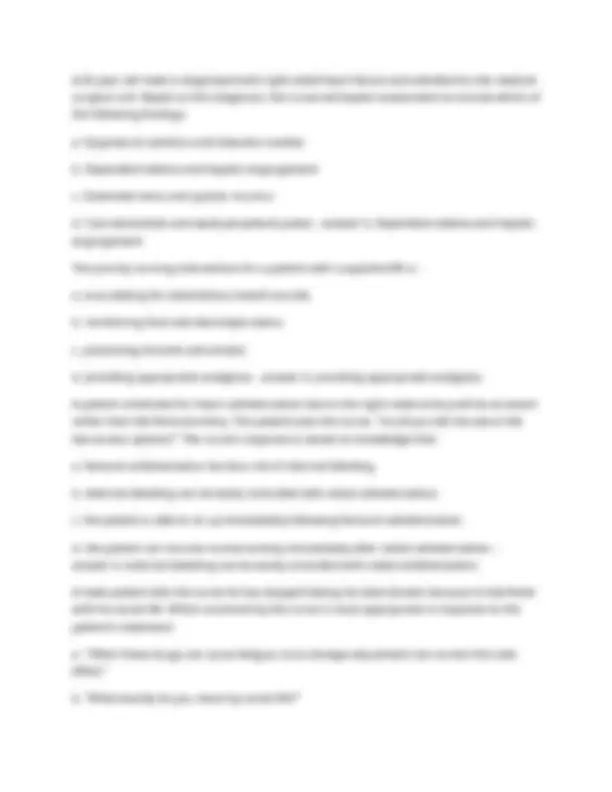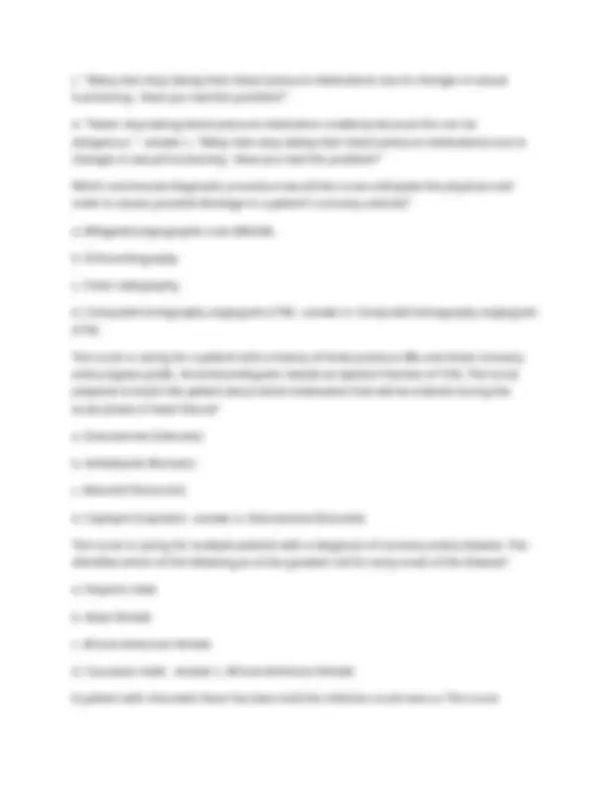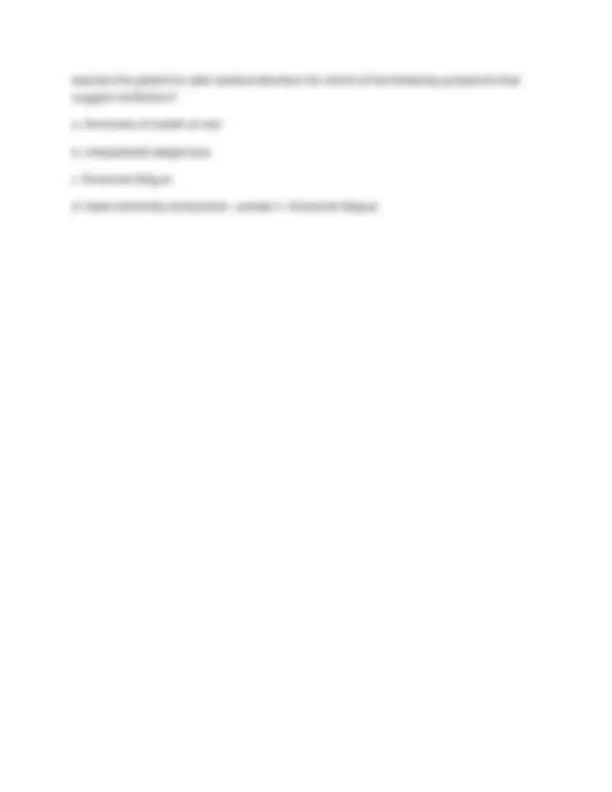





Study with the several resources on Docsity

Earn points by helping other students or get them with a premium plan


Prepare for your exams
Study with the several resources on Docsity

Earn points to download
Earn points by helping other students or get them with a premium plan
Community
Ask the community for help and clear up your study doubts
Discover the best universities in your country according to Docsity users
Free resources
Download our free guides on studying techniques, anxiety management strategies, and thesis advice from Docsity tutors
Medical-Surgical Nursing Certification Exam Study Questions With Complete Solutions.
Typology: Exams
1 / 5

This page cannot be seen from the preview
Don't miss anything!




A patient with mitral valve disease is admitted to a medical unit with fever, chills, SOB, malaise and a newly developed cardiac murmur. Based on the patient's new diagnosis of endocarditis, the nurse will begin preparing him for discharge by teaching about: a. lifestyle modifications. b. warfarin (Coumadin) therapy. c. self-administration of IV antibiotics. d. the need for fluid restrictions. - answer c. self-administration of IV antibiotics. A patient with hypercholesterolemia was prescribed pravastatin (Prevachol). The nurse should teach the patent about which of the following side effects for this medication? a. Muscle weakness b. Flushing c. Itching d. Hypotension - answer a. Muscle weakness Ms. Parsons, age 65, is transferred to a medical telemetry unit after several days in the coronary care unit for treatment of an acute MI. Ms. Parsons remains very anxious, with occasional episodes of chest pressure. Which medication does the nurse prepare for Ms. Parsons to decrease her anxiety and improve cardiac output? a. Nitroprusside (Nipride) b. Diazepam (Valium) c. Morphine sulfate (MS) d. Dopamine (Intropin) - answer c. Morphine sulfate (MS) The nurse's assessment of Mr. Harrison's response to digoxin will include which of the following as the most common early indicator of toxicity.
a. Anorexia b. Diarrhea c. Headache d. Confusion - answer a. Anorexia The nurse is also aware that some of Mr. Harrison's medications can increase serum digitalis concentrations and thus the risk for digoxin toxicity. These include: a. calcium carbonate (Tums) b. cholestyramine (Questran) c. sulfasalazine (Azulfidine) d. amiodarone (Cordarone) - answer d. amiodarone (Cordarone) The nurse teaches Ms. Pratt about the use of nitroglycerin. Following teaching, it is most important for the patient to: a. indicate she will call for help if three nitroglycerin tablets don not relieve her chest pain. b. identify flushing and dizziness as common side effects of the drug. c. verbalize understanding that nitroglycerin will help prevent her from having a myocardial infarction (MI) d. confirm she will not take the drug unless she is experiencing chest pain. - answer a. indicate she will call for help if three nitroglycerin tablets don not relieve her chest pain. A 68 year old female is admitted with a diagnosis of heart failure and ischemic cardiomyopathy. Her cardiac history includes three previous MIs and three coronary artery bypass grafts. The patient's appetite is unchanged. Which dietary restriction would be the highest priority for this patient? a. Low cholesterol b. Reduced calorie c. Low fat d. Restricted sodium - answer d. Restricted sodium
c. "Many men stop taking their blood pressure medications due to changes in sexual functioning. Have you had this problem?" d. "Never stop taking blood pressure medication suddenly because this can be dangerous." - answer c. "Many men stop taking their blood pressure medications due to changes in sexual functioning. Have you had this problem?" Which noninvasive diagnostic procedure would the nurse anticipate the physician will order to assess possible blockage in a patient's coronary arteries? a. Mitigated angiographic scan (MUGA) b. Echocardiography c. Chest radiography d. Computed tomography angiogram (CTA) - answer d. Computed tomography angiogram (CTA) The nurse is caring for a patient with a history of three previous MIs and three coronary artery bypass grafts. An echocardiogram reveals an ejection fraction of 15%. The nurse prepares to teach the patient about which medication that will be ordered during the acute phase of heart failure? a. Dobutamine (Dobutex) b. Amlodipine (Norvasc) c. Atenolol (Tenormin) d. Captopril (Capoten) - answer a. Dobutamine (Dobutex) The nurse is caring for multiple patients with a diagnosis of coronary artery disease. The identifies which of the following as at the greatest risk for early onset of the disease? a. Hispanic male b. Asian female c. African-American female d. Caucasian male - answer c. African-American female A patient with rheumatic fever has been told the infection could reoccur. The nurse
teaches the patient to seek medical attention for which of the following symptoms that suggest reinfection? a. Shortness of breath at rest b. Unexplained weight loss c. Excessive fatigue d. lower-extremity ecchymosis - answer c. Excessive fatigue